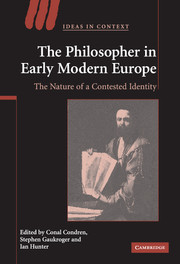Book contents
- Frontmatter
- Contents
- List of contributors
- Acknowledgements
- Introduction
- 1 The persona of the natural philosopher
- 2 The university philosopher in early modern Germany
- 3 The persona of the philosopher and the rhetorics of office in early modern England
- 4 From Sir Thomas More to Robert Burton: the laughing philosopher in the early modern period
- 5 Hobbes, the universities and the history of philosophy
- 6 The judicial persona in historical context: the case of Matthew Hale
- 7 Persona and office: Althusius on the formation of magistrates and councillors
- 8 Descartes as sage: spiritual askesis in Cartesian philosophy
- 9 The natural philosopher and the virtues
- 10 Fictions of a feminine philosophical persona: Christine de Pizan, Margaret Cavendish and philosophia lost
- 11 John Locke and polite philosophy
- Index
- IDEAS IN CONTEXT
2 - The university philosopher in early modern Germany
Published online by Cambridge University Press: 06 November 2009
- Frontmatter
- Contents
- List of contributors
- Acknowledgements
- Introduction
- 1 The persona of the natural philosopher
- 2 The university philosopher in early modern Germany
- 3 The persona of the philosopher and the rhetorics of office in early modern England
- 4 From Sir Thomas More to Robert Burton: the laughing philosopher in the early modern period
- 5 Hobbes, the universities and the history of philosophy
- 6 The judicial persona in historical context: the case of Matthew Hale
- 7 Persona and office: Althusius on the formation of magistrates and councillors
- 8 Descartes as sage: spiritual askesis in Cartesian philosophy
- 9 The natural philosopher and the virtues
- 10 Fictions of a feminine philosophical persona: Christine de Pizan, Margaret Cavendish and philosophia lost
- 11 John Locke and polite philosophy
- Index
- IDEAS IN CONTEXT
Summary
Until quite recently the history of early modern German academic philosophy was written in terms of its relation to a problem whose proper formulation is supposed to mark the autonomy of philosophy – its leap from the institutional constraints of church and state into the freedom of reason – and whose resolution marks the advent of an undivided modernity securely inhabited by all rational beings. Whether it is the reconciliation of empirical experience and pure ideas, as in Kantian histories of philosophy, or establishing the correct relation between naturalistic sciences and transcendent metaphysical concepts, as in Jesuit histories, the story is told in terms of a progressive development towards the resolution of such a problem.
Drawing on an array of recent research, the present chapter departs from this kind of philosophical history. It does so by investigating how a series of impassioned disputes as to what counted as a properly philosophical problem were carried out on the basis of rival programmes for cultivating a proper philosophical persona. Far from being dissociated from church and state, rival academic philosophies were driven by conflicting campaigns of religious confessionalisation and political state-building. Universities were central to these campaigns, for they were the principal source of teachers, clerics and officials with suitably formed personae and a proper sense of office. Rather than the story of philosophy's drive towards modernity and the autonomy of reason – whether retarded or rapid, restrained by religious affiliation or impelled by philosophical genius – the picture that emerges is one of a contest between philosophical styles and personae so intense that neither reason nor modernity would escape it.
- Type
- Chapter
- Information
- The Philosopher in Early Modern EuropeThe Nature of a Contested Identity, pp. 35 - 65Publisher: Cambridge University PressPrint publication year: 2006
- 5
- Cited by

